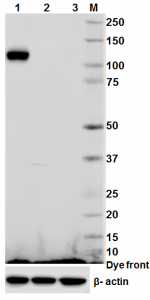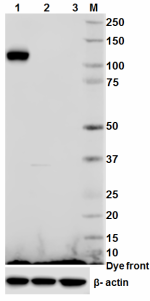- Clone
- P85E2D5 (See other available formats)
- Regulatory Status
- RUO
- Other Names
- Protein-tyrosine kinase 2-beta, Calcium-dependent tyrosine kinase, FAK2, PTK2B
- Isotype
- Mouse IgG2a, κ
- Ave. Rating
- Submit a Review
- Product Citations
- publications

-

Total cell lysates (15 µg protein) from Daudi (lane 1), HeLa (lane 2) and NIH3T3 (lane 3) cells were resolved by electrophoresis (4-12% Bis-Tris gel), transferred to nitrocellulose and probed with 1 µg/mL of purified anti-PYK2 antibody, clone P85E2D5 (upper panel). Proteins were visualized by chemiluminescence detection using a 1:3000 diluted goat anti-mouse-IgG secondary antibody conjugated to HRP for anti-PYK2 antibody or 1:10000 diluted Direct-Blot HRP anti-β-Actin antibody, clone W16197A (lower panel). Lane M: Molecular weight ladder
| Cat # | Size | Price | Quantity Check Availability | Save | ||
|---|---|---|---|---|---|---|
| 685002 | 100 µg | 212€ | ||||
PYK2, also known as FAK2, is a non-receptor protein kinase. It is structurally similar to FAK, with 48% identity of amino acids, 60% identity of sequences in the central kinase domain, and identical positions of 4 phosphorylation sites. FAK is expressed ubiquitously, indispensable for embryogenesis, and colocalized at focal contacts with integrins and growth factor receptors. Expression of PYK2 is restricted to the endothelium, central nervous system, and hematopoietic lineages. It is dispensable for organ development, localized throughout the cytoplasm and sensitive to intracellular Calcium signaling and G protein–coupled receptors. PYK2 is activated by multiple cytokines, growth factors, hormones, and neuropeptides. PYK2 regulates different signal transduction cascades that control cell proliferation, adhesion, migration and invasion. PYK2-deficient B cells and macrophages exhibit impaired mobility and responsiveness to chemokines.
PYK2 was shown to play pro-oncogenic roles in the progression and invasion of several human cancers, including glioblastoma, hepatocytoma, non-small-cell lung carcinoma, prostate cancer, breast cancer, multiple myeloma, and more. Inhibition of PYK2 reduced activation of Wnt/b-catenin signaling by destabilizing b-catenin, leading to downregulation of c-Myc and Cyclin D1.
Product DetailsProduct Details
- Verified Reactivity
- Human
- Antibody Type
- Monoclonal
- Host Species
- Mouse
- Immunogen
- Purified recombinant fragment of PYK2 (aa 815-997) expressed in E. Coli.
- Formulation
- Phosphate-buffered solution, pH 7.2, containing 0.09% sodium azide.
- Preparation
- The antibody was purified by affinity chromatography.
- Concentration
- 0.5 mg/ml
- Storage & Handling
- The antibody solution should be stored undiluted between 2°C and 8°C.
- Application
-
WB - Quality tested
- Recommended Usage
-
Each lot of this antibody is quality control tested by Western blotting. For Western blotting, the suggested use of this reagent is 0.1 - 1.0 µg per ml. It is recommended that the reagent be titrated for optimal performance for each application.
- RRID
-
AB_2572201 (BioLegend Cat. No. 685002)
Antigen Details
- Structure
- Major isoform has 1,009 amino acids and a predicted molecular weight of 116 kD.
- Distribution
-
Cytoplasm and cell membrane.
- Function
- It regulates reorganization of the actin cytoskeleton, cell polarization, cell migration, adhesion, spreading, and bone remodeling.
- Interaction
- SIRPA, SH2D3C, ARHGAP10, NPHP1, ASAP1, ASAP2, ARHGAP26, SKAP2 and TGFB1I1.
- Cell Type
- B cells
- Biology Area
- Angiogenesis, Cell Biology, Cell Motility/Cytoskeleton/Structure, Cell Proliferation and Viability, Immunology, Neuroscience, Signal Transduction, Synaptic Biology
- Molecular Family
- Adhesion Molecules, Postsynaptic proteins
- Antigen References
-
1. Dikic I, et al. 1996. Nature 383:547.
2. Mitra SK, et al. 2005. Nat. Rev. Mol. Cell Biol. 6:56.
3. Okigaki M, et al. 2003. Proc. Natl. Acad. Sci. USA 100:10740.
4. Schaller MD. 2010. J. Cell Sci. 123:1007.
5. Zhang Y, et al. 2014. Blood. 124:2675.
6. Dios-Esponera A, et al. 2015. Mol. Biol. Cell 26:3215.
7. Selitrennik M, et al. 2015. Oncotarget. 6:22214.
8. Zhao M, et al. 2016. PLoS One 11:e0149231. - Gene ID
- 2185 View all products for this Gene ID
- UniProt
- View information about PYK2 on UniProt.org
Related FAQs
Other Formats
View All PYK2 Reagents Request Custom Conjugation| Description | Clone | Applications |
|---|---|---|
| Purified anti-PYK2 | P85E2D5 | WB |
Compare Data Across All Formats
This data display is provided for general comparisons between formats.
Your actual data may vary due to variations in samples, target cells, instruments and their settings, staining conditions, and other factors.
If you need assistance with selecting the best format contact our expert technical support team.
-
Purified anti-PYK2

Total cell lysates (15 µg protein) from Daudi (lane 1)...
 Login / Register
Login / Register 







Follow Us